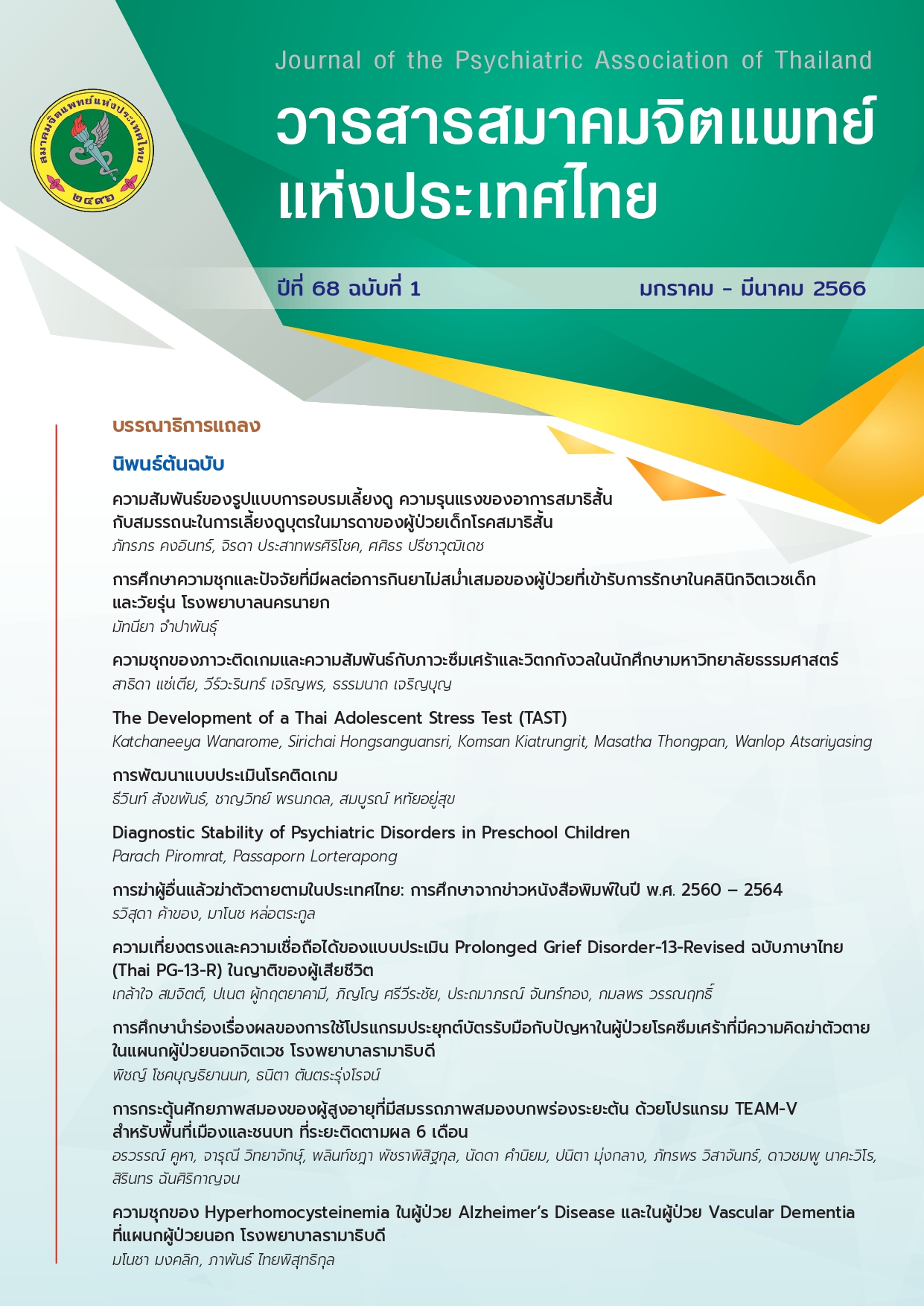Cognitive training for the elderly with Mild Neurocognitive Disorder: utilizing TEAM-V program in urban and rural areas with a six-month follow-up
Main Article Content
Abstract
Objective : This paper aims at studying the effectiveness of TEAM-V program, the model of group activity for cognitive training developed for people with mild neurocognitive disorder in urban and rural areas. This is performed though comparing the scores of cognitive abilities assessment between pre and post intervention at six-month follow-up among research participants.
Methods : Participants include the 580 elderly people with mild neurocognitive disorder aged 60 years and older from 10 research-areas. They were randomly divided into an intervention group (n=297) and a control group (n=283). The intervention group participated in the activities, which occurred six sessions every two weeks. All of the sample groups completed the Neuropsychological tests namely Alzheimer’s Disease Assessment Scale-Cognitive modified (ADAS-Cog modified) Thai version to compare between pre and post intervention scores at six-month follow-up.
Results : The comparison of scores between before and after intervention at six-month follow-up within the intervention group that participated in the TEAM-V program found the significant difference. In addition, a discrepancy score of before and after intervention was used to compare between groups demonstrated the significant difference of total scores, especially in word recall as well as delayed word recall subtest. The intervention group has shown an obvious decreased in errors. Thus, participation in group activities affects overall of cognitive abilities and memory domain when compared with the control group.
Conclusions: The study results demonstrated the participating in the TEAM-V program tend to improve cognitive abilities, especially memory domain of the elderly with mild neurocognitive disorder, when followed after intervention at six-month follow-up.
Keywords : TEAM-V program group activity, cognitive training, cognitive functions, neurocognitive disorder
Article Details

This work is licensed under a Creative Commons Attribution-NonCommercial-NoDerivatives 4.0 International License.
Articles submitted for consideration must not have been previously published or accepted for publication in any other journal, and must not be under review by any other journal.
References
Stokin GB, Krell-Roesch J, Petersen RC, Geda YE. Mild neurocognitive disorder: an old wine in a new bottle. Harv Rev Psychiatry 2015;23(5):368-76.
Petersen RC, Lopez O, Armstrong MJ, Getchius TSD, Ganguli M, Gloss D, et al. Practice guideline update summary: Mild cognitive impairment: Report of the guideline development, dissemination, and implementation subcommittee of the American Academy of Neurology. Neurology 2018; 90(3):126-35.
National Institute on Aging (NIA) [internet]. United State: NIH National institutes of Health [updated 2021 Apr 12; cited 2021 Oct 10] Available from: https://www.nia.nih.gov/health/what-mild-cognitve-impairment
World health organization. Risk reduction of cognitive decline and dementia: WHO guidelines. Geneva: World health organization; 2019.
NaKawiro D, Chansirikarn S, Srisuwan P, Aebthaisong O, Sudsakorn P, Vidhyachak C, et al. Group-based training of executive function, attention, memory and visuospatial function (Team-V) in patients with mild neurocognitive disorder. J Psychiatr Assoc Thailand 2017; 62(4): 337-48.
Department of older persons (DOP) [internet]. Bangkok: Department of older persons Ministry of social development and human security; c2016 [updated 2021 Mar 7; cited 2021 Oct 20] Available from: https://www.dop.go.th/th/know/side/1/1/335
National Statistical Office. Reporting to a study of guideline for the defining urban and rural areas in Thailand. Bangkok: National Statistical Office Ministry of Information and Communication Technology.
Schulz KF, Altman DG, Moher D. CONSORT 2010 statement: updated guidelines for reporting parallel group randomized trials. Ann Intern Med 2010; 152: 1-7.
Wongpakaran N, Wongpakara T, Reekum RV. The use of GDS-15 in detecting MDD: A comparison between residents in a Thai long-term care home and geriatric outpatients. J Clin Med Res 2013; 5(2): 101-11.
Kuha O, Vanichvarotm C, Bunmeepipit B, Thamanavat N. The comparison of relation of Mini-Mental State Examination Thai version (MMSE-Thai 2002) and Thai Mini-Mental State Examination (TMSE) in dementia screening. Nonthaburi: Institute of Geriatric Medicine Department of Medical Services Ministry of Public Health; 2008.
Tangwongchai S, Charernboon T, Phanasathit M, Akkayagorn L, Hemrungrojn S, Phanthumchinda K, et al. The validity of thai version of the Montreal Cognitive Assessment (MoCA-T). Dement Neuropsychol 2009; 3(2):173.
O'Bryant SE, Waring SC, Cullum CM, Hall J, Lacritz L, Massman PJ, et al. Staging dementia using Clinical Dementia Rating Scale Sum of Boxes scores: a Texas Alzheimer's research consortium study. Arch Neurol 2008;65(8):1091-5.
Mohs RC, Knopman D, Petersen RC, Ferris SH, Ernesto C, Grundman M, et al. Development of cognitive instruments for use in clinical trials of antidementia drugs: Additions to the Alzheimer’s disease assessment scale that broaden its scope. Alzheimer Dis Assoc Disord 1997;11(sup2):S13-S21.
Skinner J, Carvalho JO, Potter GG, Thames A, Zelinski E, Crane PK, et al. The Alzheimer’s disease assessment scale-cognitive-plus (ADAS-Cog-Plus): An expansion of the ADAS-Cog to improve responsiveness in MCI. Brain Imaging Behav 2012; 6(4): 1-7.
Meier B, Rey-Memet A, Rothen N, Graf P. Recognition memory across the lifespan: The impact of word frequency and study-test interval on estimates of familiarity and recollection. Front Psychol 2013; 4: 787.
Farias ST, Schmitter-Edgecombe M, Weakley A, Harver D, Denny KG, Barba C, Gravano, et al. Compensation strategies in older adults: association with cognition and everyday function. Am J Alzheimers Dis Other Demen 2018; 33:184-91.
Guran CA, Lehmann-Grube J, Bunzeck N. Retrieval practice improves recollection-based memory over a seven-day period in younger and older adults. Front Psychol 2020; 22: 2997.


